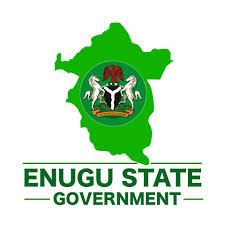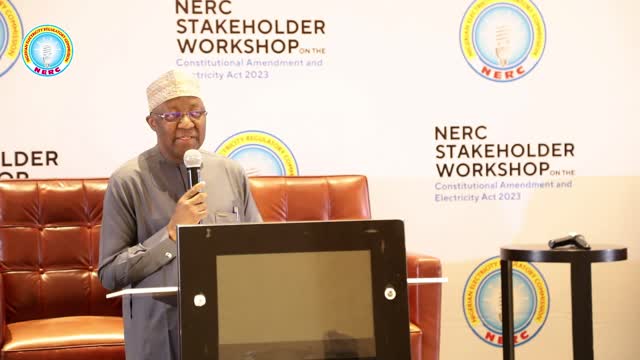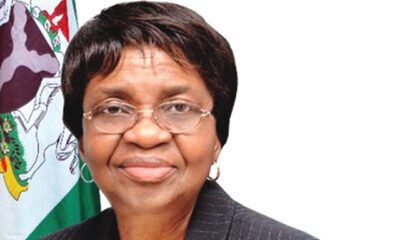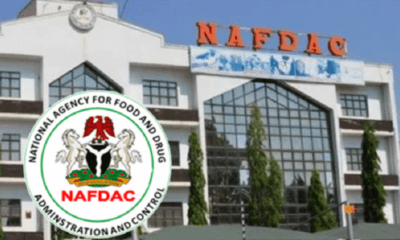News
NAFDAC ban: Cancer fear deepens as market women reject indomie products
…Importation of noodles remains banned in the country — Agency’s Dog
…Expect increase in cancer cases among children – NICRAT warns
By Sodiq Adelakun
There has been palpable fear among Nigerians, most especially market women following the allegations of a cancer-causing chemical found in Indomie noodles.
Recall that Health officials in Malaysia and Taiwan said they had detected ethylene oxide, a compound, in Indomie’s special chicken flavour noodles.
Ethylene oxide is a colourless, odourless gas that is used to sterilise medical equipment and plastics. It is said to be a cancer-causing chemical.
Malaysia and Taiwan have since recalled the Indomie special chicken flavour from shelves.
It was gathered that some market women in Nigeria have rejected the supply of indomie over fear of getting involve in the nemesis caused by the noodles.
In separate interview with our correspondent, one of the women in Sango garage market who pleaded anonymity said she has been afraid after the detection of cancer-causing chemical in indomie.
“Ever since I heard that cancer can be generated in indomie, it is now a big problem to buy more to sell to the consumers because some of them have been lamenting without knowing the type that was mentioned.
“Though, I have nothing much against the brand but the fact is I am still scared to buy more because I remembered years ago when issues like that arise during the time of my mother.
“It was a big loss to her as at that time, some of our consumers are also like that, whenever a piece of degrading information about a product arose, they will never listen to something else again, till all issues are finally clarified.”
Also, one Mama Tope who sells provision lamented about the detection and NAFDAC ban on imported indomie.
She reiterated that phobia for cancer or any hard-related disease runs in her family.
“It is no joke to continue buying indomie after exhausting the one in my shop, as this will unarguably play a fifty- fifty game in my part as many lives may be at stake.
“I heard it’s only on imported indomie, but others cannot be exempted too, they must be properly checked to maintain their patronage in market.”
A well-known seller of Noodles in Sayedoro market in Ilaro, Mr. Akeem Taiyeolu said the image of indomie as prominent product among other noodles has been affected in years ago.
He said most people have failed to recognise the difference between the brand and others.
While reacting to questions from our correspondent, he said “Indomie has always been affected in the past. People will say it kills, it affect our health but all this have been controversy for years before it was later settle.
“I can’t lie here, there has been a decline in indomie product as some people believe the first news without considering what follows the story.
“ I believe more news are still coming on board, thank God there has been a ban of the imported indomies. I know soon, there will be a lasting solution to these impeccable problem.”
Meanwhile, the National Agency for Food and Drug Administration and Control (NAFDAC) has said it will commence investigations into all noodles produced in the country to ensure all ingredients used are safe for human consumption.
The agency’s Director General, Mojisola Adeyeye, a professor, also said the importation of noodles remains banned in the country, noting that local manufacturers were duly accredited to produce locally to create job opportunities and improve the nation’s economy.
NAFDAC has made further clarifications on the controversies surrounding the discovery of cancer-causing substances in the chicken flavour of Indomie noodles by health authorities in Malaysia and Taiwan.
But, the National Institute for Cancer Research and Treatment, NICRAT, has said Nigerians should also expect an increase in cancer cases among children if the ongoing investigation by the National Agency for Food and Drug Administration and Control, NAFDAC, proves that there is presence of Ethylyne Oxide in Instant Noodles ‘Special Chicken Flavour’.
NICRAT, in a statement signed by its Director-General, Usman Aliyu, said the review of ethylene oxide shows that the compound has grave consequences for human health, especially when consumed.
Mr Aliyu said Nigerians should also expect an increase in cancer cases among children if such substance is found in locally manufactured products.
He said children are more at risk because noodles are mostly consumed by children in Nigeria.
Though the institute specifically spoke about Indomie noodles as a product in its statement, NAFDAC said its searchlight is being beamed on all noodles produced in the country and their sauces.
“Our in-depth review of ethylene oxide indicated that it is a highly reactive chemical that is used as a raw material to make other compounds such as glycol ethers and polyglycol ethers, as well as a range of emulsifiers, detergents, and solvents,’ he said.
“Ethylene oxide is also widely used as a fumigant for cleaning culinary goods, including spices. It is also frequently used to disinfect medical equipment, particularly those that might be harmed by heat sterilisation.”
He said the agency’s independent review shows that there is sufficient evidence in experimental animals for the carcinogenicity of ethylene oxide, and there is strong evidence that the carcinogenicity of ethylene oxide, a direct-acting alkylating agent, operates by a genotoxic mechanism.
“NICRAT is deeply worried that, if found that some brands of Indomie noodles contain ethylene oxide, then, Nigerians should expect an escalation of various forms of cancers in the months or years ahead, depending on how long people have consumed that brand,” he said.
Meanwhile, the National Institute for Cancer Research and Treatment, NICRAT, has said Nigerians should also expect an increase in cancer cases among children if the ongoing investigation by the National Agency for Food and Drug Administration and Control, NAFDAC, proves that there is presence of Ethylyne Oxide in Instant Noodles ‘Special Chicken Flavour’.
NICRAT, created by an Act in 2017, is an agency with the mandate to prevent, conduct research and treat cancers in Nigeria.
Indofood is one of the largest manufacturers of instant noodles globally. It serves as a favourite snack for both children and adults due to its unique taste.
Nigeria is a major consumer of instant noodles, which are produced locally.
According to data from the World Instant Noodles Association (WINA), Nigeria, Africa’s most populous nation, is currently among the largest consumers of instant noodles with 1.92 million servings as of May 2020.
The country also ranked 11th in the global demand for noodles ranking, with Indomie instant noodles being the most consumed brand in Nigeria.
In the reacting to the ban, the National Agency for Food and Drug Administration and Control (NAFDAC) has refuted reports making the rounds online that it has banned Indomie Instant Noodles assuring Nigerians of their safety while consuming the locally produced Indomie Instant Noodles. The regulatory body said on Monday through its Director-General, Prof Mrs Mojisola Adeyeye.
According to the DG, “NAFDAC did not ban Indomie Instant Noodles produced in Nigeria. NAFDAC has registered several local manufacturers and the Indomie noodles have been certified safe for consumption. The Taiwan and Malaysia noodles have nothing to do with our local producers.”
The statement offers assurance to consumers who have been exposed to a series of misleading publications that the product was banned by the regulator. The flood of local publications came up after the alleged detection of ethylene oxide, a cancer-causing substance found in Indomie’s “special chicken” flavour in Taiwan, and Malaysia by health officials in both countries.
Speaking on the issue, the Group Corporate Communications and Event Manager, Dufil Prima Foods Limited, Tope Ashiwaju, said, “We would like to assure our valued customers in Nigeria that all packs of Indomie Instant Noodles consumed in Nigeria are produced locally under strict international best manufacturing procedures with ISO certified standards.
“Our commitment to international good manufacturing processes is unwavering and the quality in every pack of instant noodles produced in all our factories in Nigeria is non-negotiable.
“We adhere strictly to the standard procedures set by the National Agency for Food and Drug Administration and Control (NAFDAC) and the Standards Organization of Nigeria (SON) in all our manufacturing processes. “We use only the finest ingredients, sourced from reputable suppliers, and our production facilities are regularly inspected and audited to ensure that they meet the highest standards,” he said.
The Indomie Instant Noodles consumed in Nigeria is produced locally by Dufil Prima Foods Limited and had produced Indomie Instant Noodle in Nigeria for almost three decades.
News
Tinubu directs education officials to conduct census of all schools, teachers


President Bola Tinubu has ordered the conduct of an extensive census to ascertain the fault lines and aid proper planning.
The presidential directive handed down on Thursday, is expected to produce data on all schools in Nigeria from primary to tertiary level, their present conditions and live-in facilities, proximity to one another and infrastructure.
It will also ascertain the number of teachers in the country, their qualifications, training support received, number of pupils and students in primary, secondary, and tertiary institutions, gender, and exam grades, among others.
The Federal Ministry of Education, currently under Mamman Tahir’s purview, will partly spearhead the process by hosting a portal or dashboard where the critical information will be dropped.
A statement by Special Adviser to the President on Media and Publicity noted that the policy DOTS, an acronym for Data Repository, Out-of-School Children Education, Teacher Training and Development, and Skill Development and Acquisition will comprehensively overhaul the education sector to improve learning and skill development, increase enrolment, and ensure the academic security of the nation’s children.
The presidency said the information that will be derived from the exercise will guide federal and state interventions for teachers’ training and development as well as overall support.
“It will also provide data on gender ratio (boys and girls), their specific learning needs, and who is in school or who has dropped out based on daily monitoring with year-by-year reporting.
“There will be a dedicated portal/dashboard in the Federal Ministry of Education, offices of state governors, and local government chairpersons, which will host and disseminate this information for the federal government, states, and local governments to monitor in real time.
“This new data tracking architecture will enable the government to track the progress of students, thus having a clear data-driven mechanism for interventions, especially concerning out-of-school children, [especially] girls, and those with specific learning disabilities, among others,” the presidential spokesman added.
On the challenges of out-of-school children’s education and training, the Federal Ministry of Education said it is already implementing the government’s policy through the activities of four of its agencies, with about two million beneficiaries already recorded.
News
Enugu Govt cautions NERC, EEDC against overcharging electricity consumers


The Enugu State Government says it will not condone any act of overcharge or extortion of electricity consumers in the state by the Enugu Electricity Distribution Company (EEDC).
Gov. Peter Mbah gave the warning on Thursday while declaring open a three-day Customer Complaints Resolution Meeting organised by the Nigerian Electricity Regulation Commission (NERC) in Enugu.
Mbah, represented by the Secretary to the State Government, Prof Chidiebere Onyia, identified electricity as a product, adding that it should have cost implications which should be fair and reflective of economic realities to all stakeholders.
“I urge NERC not to derail on the steady and quality power supply according to the band classifications,”
According to him, the state government is committed to ensuring that people have access to electricity services in the state.
The governor said that the government was currently studying underserved and unserved communities and would soon constitute the management of the newly established Enugu State Electrification Agency.
“Enugu State is poised to catalyze the economic growth of the South-East through a cost effective and efficient power supply to grow our Small and Medium Enterprises (SMEs) and industries among others,”.
While commending NERC for organising this event, the governor charged the regulatory body to endeavour to resolve most of the challenges faced by customers as complained by them.
He said that the government had started engaging with developers and investors interested in setting up power generation plants under the willing-buyer and willing-seller commercial agreement.
Mbah said that when completed, it would catalyze economic and industrial growth of the state and South-East.
News
FG will require N3.2trn to subsidise electricity in 2024 – Official


The Federal Government says it will require about N3.2 trillion to subsidise electricity in 2024, if the current tarrif increase has to be reversed.
Mr Sanusi Garba, the Chairman, Nigeria Electricity Regulatory Commission (NERC), said this at a stakeholders’ meeting organised by the House of Representatives committee on Power in Abuja on Thursday.
He said that the investments in the sector was not enough to guarantee steady power supply nationwide.
He added that if nothing was done to address foreign exchange fluctuation and non payment for gas, the sector would collapse.
He said that prior to the tarrif review, Electricity Distribution Companies (DisCos) were only obligated to pay 10 per cent of their energy invoices, adding that lack of cash backing for subsidy had created liquidity challenge for the sector.
He added that as a result of the non payment of subsidy, gas supply and power generation had continued to dip.
He said that the continued decline in the generation and system collapse were largely linked to liquidity challenge.
He said from January 2020 to 2023, the tariff was increased from 55 per cent to 94 per cent of cost recovery.
He added that “the unification of FX and current inflatinary pressurws were pushing cost reflective tarrif to N184/kwh”
“If seating back and doing nothing is the way to go, it will mean that the National Assembly and the Executive would have to provide about N3.2 trillion to pay for subsidy in 2024,” he said.
Garba said that only N185 billion out of the N645 billion subsidy in 2023 was cash backed, leaving a funding gap of N459. 5 billion.
The Vice-Chairman of NERC, Mr Musiliu Oseni also justified the recent tarrif increase, saying the increment was needed to save the sector from total collapse.
Rep. Victor Nwokolo, the Chairman of the Committee said the essence of the meeting was to address the increase in tarrif and the issue of band A and others.
Nwokolo said the officials of NERC and DISCOS had provided useful Information to the committee.
“We have not concluded with them because the Transmission Company of Nigeria is not here and the Generation Companies too.
“From what they have said which is true, is that without the change in tarrif, which was due since 2022, the industry lacks the capital to bring the needed change.
“Of course, the population explosion in Nigeria, is beyond what they have estimated in the past and because they need to expand their own network, they also needed more money, ” he said.
-
Finance3 months ago
Court orders Sen. Victor Umeh to repay N136m bank debt to AMCON
-



 Abuja Update2 months ago
Abuja Update2 months agoUNDP, FG partnership needed to achieve inclusion, equity- Minister
-
Abuja Update4 weeks ago
Banks drive stock market performance with N147bn gain
-



 Infotech3 weeks ago
Infotech3 weeks agoWorld Backup Day: NITDA urges Nigerians to ensure backup of data
-
capital market2 years ago
Rt.briscoe, FBNH, Others halts negative performance of stock market
-



 Health2 weeks ago
Health2 weeks agoImmunisation: FG, GAVI seek synergy with Sokoto Govt.
-
Submission Guidelines3 months ago
CALL FOR SUBMISSIONS: POETRY COLUMN-NND
-
Infotech1 week ago
Forex for Beginners: Unveiling the currency exchange and how to trade it














